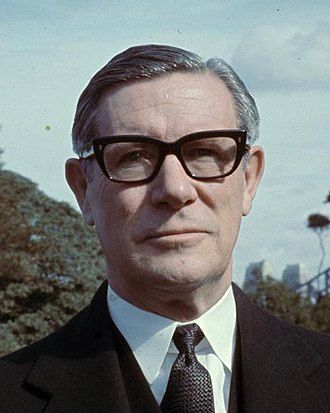Nigel Hubert Bowen
TKS 1922 - 1927
POLITICIAN and JUDGE

“ Some people excel in a particular aspect of their lives but to a few it is given to excel in most” and Nigel Hubert Bowen was one who excelled throughout his long and distinguished career.
While at The King’s School (1922-1927) Nigel received the Wentworth Bucknell Scholarship and the Archdeacon Gunther Memorial Prize. Nigel received a Burton A Scholarship graduating LLB (Honours 2nd Class) from Sydney University and was admitted to the Bar in 1936.
While he represented St Paul’s College at Sydney University in 1st XI Cricket and 1st XV it was in boxing where Nigel achieved his greatest notoriety . He fought in the Finals of the Novice Boxing Championships at Sydney University and despite being soundly thrashed a close up of his battered face appeared in the front pages of the Sydney papers. An event that his colleagues would often remark on and one which he accepted in good humour.
During World War 2 while training with the 3rd Armoured Regiment, Nigel was selected to undertake an Intelligence Officer’s Course. Nigel rose to the rank of Captain following his appointment as a member of staff at 1st Australian Headquarters in Brisbane. In 1943 he was appointed second in command and adjutant of the 43rd Landing Craft Company. This unit distinguished itself by providing supplies and provisions to troops in the north of Papua New Guinea. In March 1945 Nigel led a dangerous but successful reconnaissance mission behind enemy lines west of Wewak to determine whether a landing craft base could be established there. Other members of the 43rd Landing Craft Company with Captain Nigel Bowen were Captain Frank Packer and Corporal Ninian Stephens.
Following his discharge from the AIF, Nigel consolidated his Law career. From 1946 he edited the Australian Law Journal for twelve years and in 1953 was appointed Judge of the Court of Appeal and later Chief Judge in the Equity Supreme Court of NSW. Nigel served a three year term as Vice-President of the Law Council of Australia from 1957.
In 1964 as Member for Parramatta, Nigel entered Federal politics. When he entered politics he had a passionate concern for the country as a whole. This was far more important than party sectionalism. Nigel had a deep concern for people and their welfare.
During his time in Canberra Nigel was Attorney General 1966-1969, 1971) , Minister for Education and Science and Foreign Minister ( 1971-72). Highlights of his political career were the introduction of the 1968 Copyright Act especially his personal interest of intellectual property rights, his involvement in legislation that would later become the Foreign Investment Review Board and architect of the Petroleum Submerged Lands Act.
After Nigel left politics in 1973, he was appointed a Judge of the Supreme Court. This was followed the next year by his appointment as the Chief Judge in the Equity Court and in 1976, the same year as his knighthood as Chief Justice of the Federal Court. In 1988 in recognition of his work for the Legal profession and the Law he was awarded honorary membership of the Law Council of Australia. Similarly Sydney University awarded Nigel a Doctorate of Laws recognising his contribution to the profession.
Testimonies at Sir Nigel Bowen’s final sitting at the High Court in 1990 and at his funeral in 1997 spoke of a man universally recognised as a lawyer of great learning. A lawyer who made his mark on all he did, but more importantly a man of modesty, of utmost courtesy , humility, patience and with a great love of humanity. A man to whom much was given but who gave much in return.